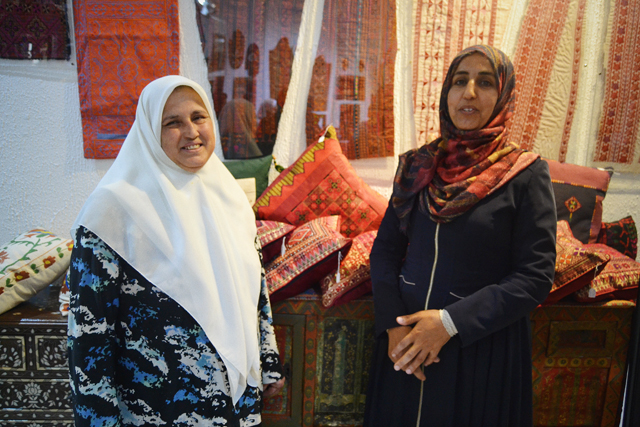AMMAN — When Iman Imarat started embroidering for the Jordan Craft Centre (JCC) Al Aydi at the age of 22, she knew little about how much her life was about to change.
Almost 20 years later, the Ajloun-based handcrafter smiles as she explains how she gets to sustain her family through the tradition her mother and grandmother passed onto her.
“We used to have a small house and we lived in very poor conditions, but now, I can look back and say that I am proud of what I have accomplished,” Iman said.
Al Aydi was founded in 1979 by the Jordan Alumni of the Lebanese American University — formerly known as Beirut College for Women — with the aim of preserving the local heritage and supporting Jordanian handcrafters and artisans by securing local and international marketing channels for their products, according to the centre.
Nowadays, Al Aydi has become a "cultural benchmark" of the national identity preserved in unique handcrafts such as rugs and carpets, jewellery, embroidery, pottery, wood and metal work, basketry or glass crafts.
Ahmad Hussain, director of Al Aydi, noted that the name of the centre, "the hand" in Arabic, “aims to reflect the potential of the artisans to produce with their own hands”, standing for the more than 80 craftspeople whose works are available at the centre.
But the influence of Al Aydi goes beyond the centre itself, and artisans like Iman have been able to create and support their own networks of handcrafters.
“Nothing could make me feel more fulfilled than getting to support these women and provide them with a livelihood,” Iman said, referring to the 50 embroiderers she sponsors in the Ajloun area.
Life has also changed for Najla Hussain, a specialist in cutting and sewing from eastern Amman.
Prior to the beginning of her journey with Al Aydi more than 25 years ago, Najla used to work in a workshop where the pressure would not let her creativity flourish. “Now, I get to work in the comfort of my own home, and I have full freedom to organise my working hours,” she said, adding that her job has provided her with the stability of a better income.
“I could not be prouder of these women,” said the director of Al Aydi, noting that their stability at work has also triggered a "cultural change" within communities like Ajloun.
“We don’t have to go further than 20 years ago to find a culture of shame surrounding those village women who decided to work,” said Hussain, explaining that “women like Iman have made people in these communities more used to seeing a woman working, travelling by herself to the city to get the materials and becoming independent — they are strong and empowered".
But the craftspeople are not the only ones benefiting from the centre according to Hussain, who believes that Al Aydi “works as a bridge” between the local artisans and the customers, who walk out of the craft centre with a “unique representation of the Jordanian heritage”.
“All these crafts are made by people with identity, and each of these pieces has its very own story to tell,” he added.
Co-founder Widad Kawar recalled the early days of the craft centre, when she and other graduates decided to preserve and promote the Middle Eastern heritage through a human development programme.
"We became the first foundation to take care of the crafts in Jordan,” said Kawar, noting that they decided to help the craftspeople because they thought “they were being used” by business owners who would sell their work at a “ridiculously high” price to later keep all the profits.
Hind Sharif Nasser, Princess Wijdan, Samiah Alzaro and Abla Kawar were among the many people who helped in providing the funds the centre needed to take off.
To this day, Al Aydi has grown to benefit many handcrafters as well as students through the granting of scholarships, Kawar continued. And the centre has partnered with the Widad-Kawar Home for the Arab Dress for an exhibition focused on the different techniques and uses of bedouin weavings, scheduled to be inaugurated on October 7.
